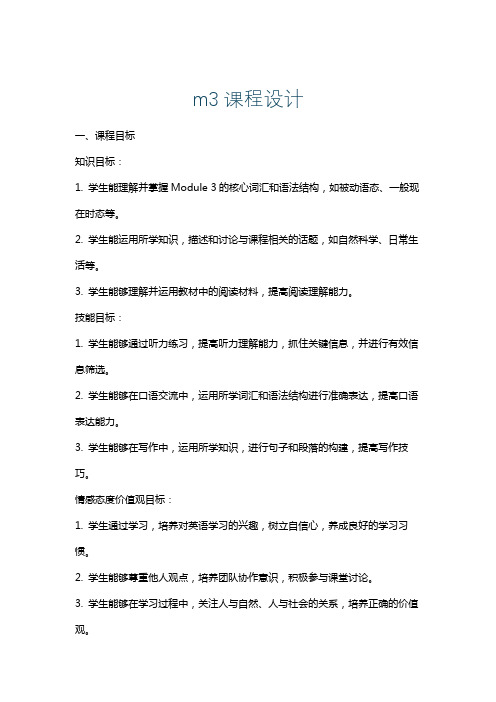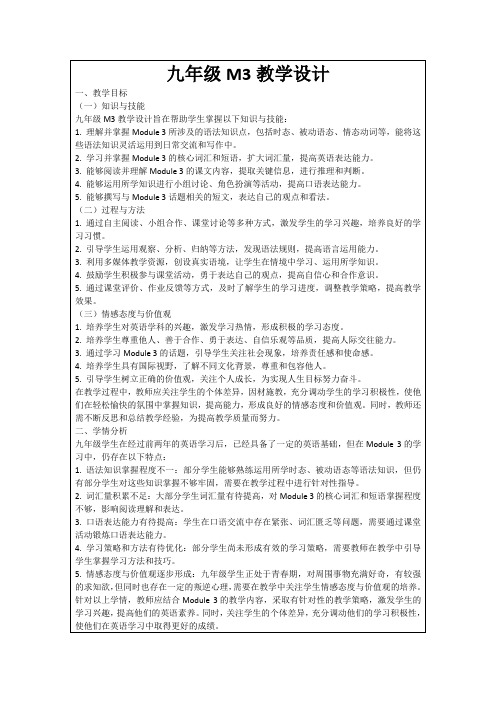M3 Introduction & Cultural Corner
M3-1 Introduction

3. Your friendship is as important as your relationship with your family .
4. It takes time to really get to know someone and find out what they are like . 5. Everyone feels shy and lonely at some time in their life . 6. To make friends easily , you need to be very kind . 7. To make friends easily, you need to be able to chat about unimportant things .
3. to believe that someone is good and honest 4. a relationship between two people who are friends
5. to talk in a friendly way , especially about unimportant things
When I am sad, I think friendship is a warm word. It can bring me happiness again. When I am in trouble, I think friendship is a strong hand. It can help me escape my troubles. When I sit in a quiet place, I think friendship is a very wonderful feeling. It can’t be pulled and torn, because it is in everyone’s heart. It is there from the beginning to the end of our lives.
m3课程设计

m3课程设计一、课程目标知识目标:1. 学生能理解并掌握Module 3的核心词汇和语法结构,如被动语态、一般现在时态等。
2. 学生能运用所学知识,描述和讨论与课程相关的话题,如自然科学、日常生活等。
3. 学生能够理解并运用教材中的阅读材料,提高阅读理解能力。
技能目标:1. 学生能够通过听力练习,提高听力理解能力,抓住关键信息,并进行有效信息筛选。
2. 学生能够在口语交流中,运用所学词汇和语法结构进行准确表达,提高口语表达能力。
3. 学生能够在写作中,运用所学知识,进行句子和段落的构建,提高写作技巧。
情感态度价值观目标:1. 学生通过学习,培养对英语学习的兴趣,树立自信心,养成良好的学习习惯。
2. 学生能够尊重他人观点,培养团队协作意识,积极参与课堂讨论。
3. 学生能够在学习过程中,关注人与自然、人与社会的关系,培养正确的价值观。
课程性质:本课程为英语学科Module 3的课程设计,旨在巩固和提高学生的英语基础知识,培养其听、说、读、写四项基本技能。
学生特点:本课程针对的学生为XX年级,他们对英语学习已有一定的基础,具备一定的自主学习能力,但在词汇、语法和口语表达方面有待提高。
教学要求:结合学生特点,本课程要求教师采用生动有趣的教学方法,激发学生的学习兴趣,注重培养其语言实际运用能力,同时关注学生的情感态度价值观培养。
在教学过程中,将目标分解为具体的学习成果,便于后续的教学设计和评估。
二、教学内容本章节教学内容紧密围绕课程目标,结合教材Module 3的内容进行组织,具体包括以下部分:1. 词汇:学习并掌握教材中Module 3的生词,包括名词、动词、形容词等,如:environment, protect, important, recycle等,同时拓展相关词汇,提高学生的词汇量。
2. 语法:学习一般现在时态和被动语态,通过实例分析和练习,让学生掌握语法规则,并能将其运用到实际语境中。
3. 阅读理解:分析教材中的阅读材料,指导学生掌握阅读策略,提高阅读理解能力,并对文章主旨、观点和细节进行深入探讨。
牛津高中英语M3U3单词优选讲解

牛津高中英语 M3U3单词讲解Unit3 (M3)1. civilization(n.)文明2. lecture(n.)讲座; (冗长的 ) 教训,训斥lecturer 授课老师give a lecture to sb on/about sthattend a lectureI know I should stop smoking—don’t give me a lecture about it.3. found(vt.)兴建,创办(f ounded; founded)=set upfound a club/company Founded in 1724, the company was successful.4.BC(abbr.) 公元前=Before the birth of Christ5.Roman(n.) 罗马人(adj.)罗马的,罗马人的When in Rome, do as the Romans do.6.take over 抢夺;接收7.volcano(n.)火山volcanic(adj.)火山的volcanic eruption/ash8.AD(abbr.) 公元 =Anno Domini9.erupt(vi.) (火山等)爆发 eruption(n.)va(n.)熔岩,火山岩11.ash(n.)灰(烬)12.pour(vi.) 涌流,倾泻(v t.)倒出(液体)There are several chemical factories pouring waste water into the river. pour sb a cup of teaIt never rains but it pours.不雨则已,一雨倾盆。
(祸不只行。
)13.unfortunate(adj.) 不幸的,遗憾的unfortunately(adv.) fortune(n.)运气;财富 misfortune n.不幸make a fortuneseek one’s fortunetell one’s fortune14. mud(n.) 泥浆,烂泥muddy(adj.)泥泞的15.decorate(vt.)装饰,装潢 decoration(n.)decorate⋯with⋯用⋯来装潢16.flee (vt/vi.)闪避,逃跑;迅速走开 -fled-fled.flee the country17.researcher(n.)研究者,者18.true-to-life(adj.)传神的19.disaster(n.)灾natural disastersspell disasters致使灾20.destroy(vt.) 坏,摧~ed, ~eddestruction (n.)破坏destructive(adj.)破坏性的mercial(adj.) 商业的,贸易的(n.)(电台或电视播放的 )广告e-commerce(n.电)子商务22.wealthy(adj.)丰饶的,丰饶的 =well-off/richwealth(n.)财富Health is wealth.23.gradually(adv.) 渐渐地,逐渐地a gradual change in the climate24.sandstorm(n.)沙尘暴,风沙25.scholar(n.) 学者scholarship(n.奖)学金26.cultural(adj.) 文化的culture(n.)cultural differences27.institute(n.)(教育或其他专业 )机构,研究所28.ruin(n.) 废墟;毁坏(v t.)破坏,破坏ruin one’s future/healthIt rained suddenly, ruining our picnic. 毁掉了我们的野餐The building was in ruins after the earthquake.29.remains(n.) 遗物,遗迹,遗骸remain linking v.依旧是vi.节余,余留;逗留remaining adj.human remains prehistoricremains remainsilent/standing/seatedIt remains to be seen whether ⋯the remaining money=the money leftwith some problems remaining to be solved 30.beneath(prep.) 在 -----之下31.pot(n.)罐,The pot calls the kettle black.五十步笑百步。
初一m3英语作文

探索英语世界:初一M3的旅程In the world of languages, English stands tall as a global language, connecting people across borders and cultures. For many students in Grade 7, Module 3 (M3) marks a significant milestone in their English learning journey. This module introduces new vocabulary, grammar concepts, and writing skills that prepare them for more advanced English learning.As students embark on this M3 adventure, they encounter a diverse range of topics that are both engaging and challenging. From discussing their favorite subjects and activities to describing people and places, M3 encourages students to express their thoughts and ideas in English. The module also focuses on developing students' writing skills, as they learn to structure their ideas and write coherent paragraphs.One of the most exciting aspects of M3 is the exploration of grammar. Students delve into the complexities of the English language, learning about present continuous tense, modal verbs, and direct and indirect speech. This knowledge not only helps themunderstand and use English more accurately but alsoprepares them for more advanced grammar concepts in the future.Vocabulary acquisition is also a crucial part of M3. Students encounter new words and phrases related todifferent topics, expanding their English vocabulary and enabling them to express themselves more fluently. As they learn new vocabulary, they also discover the joy of using English to communicate their ideas and thoughts.Writing skills are honed in M3 through variousactivities and exercises. Students practice writing about themselves, their families, and their friends, developing their ability to organize their ideas and express them clearly in writing. They also learn to edit their work, improving their writing skills and refining their understanding of the English language.Overall, M3 in Grade 7 English is a rich and rewarding experience that lays the foundation for further English learning. It encourages students to explore the language, discover their own voice, and express their thoughts and ideas in a global language. As students progress through M3,they not only improve their English skills but also gain a deeper understanding of different cultures and perspectives. **探索英语世界:初一M3的旅程**在英语这门语言的世界里,它作为一种全球性的语言,连接着不同国家和文化的人们。
M3说课稿

情感、 态度、 价值
观
1.了解不同的体育运动,了解不同人的体育爱好2.培养学生对体育运动 的兴趣
敬请领导批评指正! 谢谢大家!
说课标
听
▪能听懂接近自然语速、
熟悉话题的简单语段, 获取主要信息。
语言技能
写
▪能正确使用标点符号, 能写出简短的文段, 如简单的指令、规则。
说
▪能引出话题并进行几个 话语的交谈,能在教师的 指导下参与角色表演等
活动。
读
▪能从简单的文章中找出有 关信息,能根据上下文猜 测生词的意思。
分级标准
课程标准
主要内容是:通过 Daming,Tony,Betty三人在 家观看电视足球比赛节目时 的一段对话,对比他们各自 对观看比赛和参加比赛的感 受,自然地导入部分双音节 和多音节形容词的比较级。
Listening Activities 3-5
使学生认识到英语单词在句子中的连读规则; 能谈论自己喜欢的体育项目。
学习策略
在学习中积极思考,主 动探究,善于发现语言 的规律并能运用规律举 一反三;制定切合实际 的英语学习计划。
情感态度
有明确的学习目的,能认 识到学习英语的目的在于 交流;能在小组活动中积 极与他人合作,互相帮助, 共同完成学习任务。
了解英语国家的人 际交往习俗;了解 世界上主要的文体 活动。
单元目标
expressions
1.Listen and repeat 2.Work in pairs. 1.Listen and match导入
高中英语m3教学资料-m3 unit2 reading

his customers back.
Reading Do Ex 1 on page 11 :
1. Usually Wang Peng’s restaurant
was full of people.
T
2. Yong Hui could make people thin in
two weeks by giving them a good
diet. F
It would take longer than that.
2020/4/25
3. Wang Peng’s regular customers
often became fat.
T
4. Yong Hui’s menu gave customers more emery-giving food. F No. it gave them protective food but no energy-giving or bodybuilding food.
3.Wang Peng found out why he had lost his customer and decided to win them back.
2020/4/25
Main idea of each part:
Part 1 Wang Peng is worried because
(para 1) his restaurant is not as full as
2020/4/25
5. Wang Peng’s menu gave customers more protective food. F
6. Wang Peng decided to compete with Yong Hui by copying her F menu. He decided to advertise the benefits of his menu.
九年级M3教学设计

五、作业布置
针对Module 3的教学内容,特布置以下作业,旨在巩固课堂所学知识,提高学生的英语综合运用能力:
1.语法练习:完成课后练习册中与Module 3相关的语法练习题,强化对时态、被动语态、情态动词等知识点的掌握。
2.阅读理解:阅读一篇与Module 3话题相关的文章,并完成相关阅读理解题,培养学生提取关键信息、推理判断的能力。
4.学习策略和方法有待优化:部分学生尚未形成有效的学习策略,需要教师在教学中引导学生掌握学习方法和技巧。
5.情感态度与价值观逐步形成:九年级学生正处于青春期,对周围事物充满好奇,有较强的求知欲,但同时也存在一定的叛逆心理,需要在教学中关注学生情感态度与价值观的培养。
针对以上学情,教师应结合Module 3的教学内容,采取有针对性的教学策略,激发学生的学习兴趣,提高他们的英语素养。同时,关注学生的个体差异,充分调动他们的学习积极性,使他们在英语学习中取得更好的成绩。
2.词汇积累:Module 3的词汇量较大,学生记忆和运用词汇的能力是教学的重点。
设想:采用词根词缀记忆法、联想记忆法等多样化的词汇教学方法,帮助学生高效记忆单词,并能在实际语境中灵活运用。
3.口语表达能力:提高学生的口语表达能力,使其能够自信地参与课堂讨论和交流。
设想:组织丰富的口语活动,如小组讨论、辩论赛等,鼓励学生积极参与,提高口语表达能力。
3.能够阅读并理解Module 3的课文内容,提取关键信息,进行推理和判断。
4.能够运用所学知识进行小组讨论、角色扮演等活动,提高口语表达能力。
5.能够撰写与Module 3话题相关的短文,表达自己的观点和看法。
(二)过程与方法
关于m3制定计划的英语四人演讲

关于m3制定计划的英语四人演讲## English Answer ##。
Introduction.The M3 process, also known as Mission, Methods, and Measurement, is a planning framework used to develop effective strategies and achieve desired outcomes. It involves clearly defining the mission (purpose) of the plan, determining the appropriate methods (actions) to achievethat mission, and establishing clear metrics (measurements) to track progress and evaluate success. By following the M3 process, individuals and organizations can ensure thattheir plans are well-structured, actionable, and alignedwith their goals.Mission: Defining the Purpose.The first step in the M3 process is to establish the mission of the plan. This involves clearly defining theoverall purpose and objectives of the plan. The mission statement should be concise, specific, and measurable. It should provide a clear understanding of what the plan aims to achieve and the desired outcomes.Methods: Determining the Actions.Once the mission has been defined, the next step is to determine the methods that will be used to achieve that mission. This involves identifying the specific actions, tasks, and activities that need to be carried out to accomplish the desired outcomes. The methods should be aligned with the mission statement and should be realistic and achievable within the available resources.Measurement: Tracking Progress.The final step in the M3 process is to establish clear metrics to track progress and evaluate success. This involves identifying the specific indicators that will be used to measure the plan's effectiveness. The measurements should be objective, quantifiable, and relevant to themission statement. They should provide insights into whether the plan is meeting its objectives and whether adjustments are needed.Benefits of the M3 Process.The M3 process offers several benefits for planning and strategy development. It helps to ensure that plans are:Well-structured: The M3 framework provides a consistent and organized approach to planning, ensuring that all necessary elements are considered.Actionable: By breaking down the mission into specific methods, the M3 process makes it easier to take concrete actions towards achieving the desired outcomes.Measurable: The establishment of clear metrics allows for objective evaluation of progress and success, enabling timely adjustments and improvements.Aligned: The M3 process ensures that the plan's methodsand measurements are directly aligned with the overall mission, leading to greater effectiveness.By following the M3 process, individuals and organizations can create plans that are clear, actionable, and measurable. This structured approach helps to ensure that plans are aligned with goals and that progress can be effectively tracked and evaluated.## 中文回答 ##。
- 1、下载文档前请自行甄别文档内容的完整性,平台不提供额外的编辑、内容补充、找答案等附加服务。
- 2、"仅部分预览"的文档,不可在线预览部分如存在完整性等问题,可反馈申请退款(可完整预览的文档不适用该条件!)。
- 3、如文档侵犯您的权益,请联系客服反馈,我们会尽快为您处理(人工客服工作时间:9:00-18:30)。
You travel very quickly and quietly. The train uses less energy.
Homework
Preview the reading text.
plane, helicopter land:____________________________________________________________
Fill in the blanks with words and phrases in the right form
get on, drive, get off, take off, get into, land, get out of, take ride,
My First Trip by Subway
Where
chengdu
How
When
With Whom
My son
Feelings
by subway before two years
fresh excited nervous unforgettable
Discussion
What kind of train is the fastest one in the world? Where is it? Have you ever been to Shanghai? Do you know anything about the Maglev?
5 He _______ to work every day. drives
6 The plane ________ on Beijing Airport after 10 hours’ flight. landed
7 I got up late this morning and had to _______ a taxi to my office. take
1 I ______ the bus at Ding Xiang bus station and got off got on ________ at Tai Yuan bus station.
2 I _____ the bicycle down town to visit one of my friends last weekend. rode 3 Hurry up! The plane __________ at five o’clock. You are getting late. takes off 4 He ______________ his car to see what happened at the crossroad. got out of
subway
train
helicopter
plane
bicycle
motorbike
car
ship
ferry
tram
bus
taxi
boat
Match the words in the box with the pictures.
Which means of transport would you like to use to travel? Why? (Say as much as you like.)
Answer the questions.
Which of the vehicles travel on roads? taxi, car, bus, bicycle, motorbike Which of them travel on rails? tram, train, subway Which of the vehicles travel on water? ferry, ship, boat Which of them travel in the air? helicopter, plane Which of them can you use to travel a long distance? plane, train, ship
Read the passage and answer the questions.
What are the main differences between a magnetically levitated train and an ordinary train? It is faster, less noisy and uses less energy. What are the advantages of the Maglev – the fastest train in the world?
motorbikes buses
3 Match the verbs with the means of transport in activity 1. verbs can refer to more than one means of transport. get on get off get into
Describe the first time you travelled a long distance. Say how old you were, where you went and who you went with.
Example: I first travelled a long distance by train when I was six years old. I went with my parents from Shanghai to Beijing.
Different vehicles travel in different ways
A long distance
Roads taxis bicycles
Rails
Water
Air
trams ferries helicopters planes trains planes trains buses helicopters
Some of the
get out ( of ) ride drive take off
land
get on: _________________________________________________________ bus, train, tram, bicycle, motorbike, ferry, plane get off: _________________________________________________________ bus, train, tram, bicycle, motorbike, ferry, plane
train , taxi, bus drive: __________________________________________________________
take off: ________________________________________________________ plane, helicopter
Discussion
How many means of transportation do you know? What are they? How many means of transportation can you take to go to the Jianyang Middle School? What are they? How many means of transportation can you take to go to Beijing? ____________________________________________________ taxi, helicopter
get out (of):______________________________________________________ taxi, helicopter ride:____________________________________________________________ bicycle, motorbike
